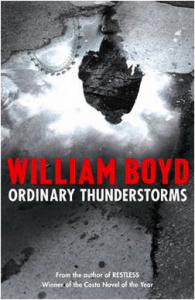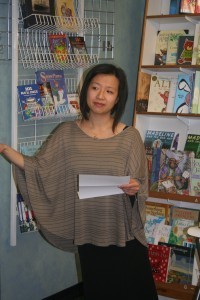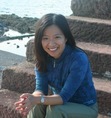Y.S. Lee's Blog, page 25
May 16, 2012
My brain is tingling
Hello, hello! My friend, Colette Colligan, is a terrifyingly smart person who pops into my life every now and again with something that completely changes my view of the nineteenth century. Those of you who’ve read A Spy in the House will probably remember a scene that pays homage to Colette’s doctoral thesis on Obscenity and Empire (her thesis was later published as The Traffic in Obscenity from Byron to Beardsley).
Her most recent email casually mentioned that there’s a book called The Female Detective. Published in 1864. I know, I know! Bookfinder.com has come up with nothing, which is both shocking and a fantastic challenge. In the meantime, I’m going to borrow Joseph A. Kestner’s Sherlock’s Sisters: The British Female Detective, 1864-1913 for an overview.
This is the thing with research: it never ends. It’s infuriating and alarming (what did I miss, that I really should have known about?) but also a wonderful and constant reminder of how much there still is to learn. And I adore that.
May 9, 2012
I’ll never tire of sewers
Really, what’s not to love? That’s why I recommend this BBC radio program about the desperate state of London’s current sewer system. In the late 1850s (immediately following the action of A Spy in the House), Victorian engineer Joseph Bazalgette designed and built a modern sewage system for the city of London. 150 years later, London has outgrown it, and debate now rages about what to do next.
Every time there’s a heavy rain, the sewers overflow into the river itself. The river’s full of refuse. The fish are dying. All they need now is an unusually hot May, and the Great Stink of 1858 could replay itself.. The program is called Costing the Earth.
May 2, 2012
A women’s detective agency? Why?
Hello, friends! I’m guest-blogging this week at Bites, where Donna asked me why I chose to write about a women’s detective agency in Victorian London. The short answer? I love bright and shiny anachronisms. The longer answer is here.
And did you know that this coming week, May 5 – May 12, is Canadian Children’s Book Week? In celebration of children’s books, my friends at Young Kingston have organized a group signing at Novel Idea Books on Sunday, May 6. I’ll be there from 3 to 4 with the award-winning Ann-Maureen Owens. Hope to see you there!
April 25, 2012
Sick day
Hi, all. I’ve been holed up this week with one viral kid and one teething one. I’ll see you on the other side, wherever and whenever that happens to be!
April 18, 2012
Writing Redux
Hello, friends. I was absent again last week – not because I wasn’t thinking about you, but because I was speechless with frustration. Let me tell you why.
About two years ago, I wrote a little quiz called What Kind of Writer Are You? (It was originally for Teenreads.com, but you can also find it here.) It was purely for fun, not the kind of thing I spent long hours doing psycho-anthropological research on. I liked that it was silly. A play on the kind of Personality Type quiz I love and detest. It was written, posted, forgotten. And now it’s come back to haunt me.
Over the past few months, I’ve been struggling with what kind of writer I used to be, and what kind of writer I will be. I used to set out with a rough idea, fiddle around a bit, write a whole lot, scrap much of it, research some more, become inspired, and start the whole process again. That’s how A Spy in the House, The Body at the Tower, and The Traitor in the Tunnel were written. The process had some frustrations and many redundancies, but it worked, fundamentally.
And then I decided that it wasn’t good enough. For my fourth novel, Rivals in the City, I decided to tinker with the process: I was going to be a Planner. Oh yes. I was going to plot out the whole novel, figure out all my turning points, each small crisis, every transition, right up to the denouement. I even saved wee scraps of dialogue (mostly banter, my Achilles heel) I’d surely be able to plug into this orderly opus. And then, when everything was organized, I was going to sit down and crank this thing out. Sure, the writing itself would be less of an adventure. But it would be worth it, because I would be So. Very. Efficient.
You know what’s coming, don’t you? Last week, the whole thing crumbled. I found myself procrastinating, obsessively browsing Etsy for gifts still in the far future, reading blog after blog after blog – all because I didn’t want to write the book I’d so diligently mapped out. In fact, I’d impulsively written Mary into a scene in which she, too, was at an existential dead-end. Worse, I couldn’t figure out how to rescue her. (Here, you may – if you wish – insert a joke about art imitating life and/or vice versa. I would, but then I’d have to look myself in the mirror afterwards.)
I think, however, that I know how to rescue myself. And it involves – *werewolf howl of frustration* – jettisoning the Plan. I’m going back to my messy, inefficient, non-linear ways. And I’m going to write a book I love. Yes I am. I hope you’ll love it, too.
Happy writing and reading to you!
P.S. If you do take the quiz, let me know how you do! Ironically, it doesn’t work for me. Yes, I’m that inconsistent.
April 4, 2012
Night shift
Hello, friends. I have a confession to make: I've always been quite a prima donna when it comes to writing time. When I was childless, I needed three-hour blocks of uninterrupted writing time, minimum, to feel that I was making progress on a manuscript. When we had a baby, that shrank to two hours – still a lot to ask, but with the support of my superstar spouse, we made that happen.
And now we have 2 children. The elder goes to preschool, part-time. The (new) baby is never more than a few metres from me, day and night. Basically, the I-must-have-privacy-and-silence-and-a-warmup-ritual-that-involves-freshly-ground-french-pressed-coffee thing is, um, not working out.
Instead, I'm learning to write like thousands (tens of thousands? gazillions? pity no one measures these things) of women have before me: in unpredictable increments that sometimes pop up when I least expect them. For example, last week I dropped off our son at preschool and the baby fell asleep in the car on the way home. I sprinted into the house, grabbed my laptop, hopped into the passenger seat, and wrote until she woke up. The tally? 800 words in 45 minutes. Yes, I'm still feeling mighty smug about that one.
Obviously, that's a best-case scenario and it certainly doesn't happen every time I open the laptop. I still have writing sessions where I fiddle with a single paragraph for 20 minutes, or worse yet, check email obsessively and write half a (bad) sentence. But I'm learning.
The other thing that's changing is when I write. Now, a few evenings a week after the kids are asleep, I ignore the rest of my life (the dishes, the half-read novel, my lovely husband) and focus. I usually log in to Twitter and propose a writing sprint to anyone who's kicking around. And off I go.
It's messy and inconvenient and fundamentally at odds with my circadian rhythm (I'm one of those people who likes to go to bed at 10), but it's working. Mostly. And whenever I feel particularly low about my word count, I think about one of my favourite Victorian novelists, Wilkie Collins, who was a consummate procrastinator.
When Collins was in the middle of a serial novel (a novel published in a magazine in many instalments), he would turn up at the offices of the magazine on the day of the printer's deadline. There, he would finally sit down and write. As he finished each page, someone would run that sheet of paper down to the printer's offices, where they would typeset it and finally print it.
It makes me feel queasy just thinking about it.
How do you write? Are you a Collins-esque procrastinator, or a marvel of efficiency?
March 28, 2012
A Reader Reports: Boys’ Club
Hello, friends. I just noticed that I completely forgot to blog last week. Apologies. I don’t know what to say except that I may have lost the entire week, while I was at it. Am I really a week older, with almost nothing to show for it? *headdesk*
It’s been a while since I talked about my recent reading. There’s been a lot of distraction, a little crafting, many bits of the New Yorker (one day, I’ll read every article in a given issue, but I don’t think it’ll be this year), and three astoundingly good books, in particular:
Ordinary Thunderstorms, by William Boyd
Ordinary Thunderstorms starts as a straight-up thriller of the best kind: bold, expansively imagined, and genuinely, well, thrilling. In the opening scenes, a rather bland young academic becomes a murder suspect and loses his identity through a chain of small but damning accidents. It is one of the most terrifying things I’ve read precisely because the protagonist Adam is, as his name suggests, such an Everyman.
The novel makes its way through different contemporary Londons, which I loved, and there’s a juicy corruption scandal at its heart. But an interesting thing happens along the way, which is that the pace of the thriller starts to meander and it doesn’t really matter, because the social world of the novel is so fully realized that you become fully engrossed in that, instead. It’s a thriller that becomes an examination of different lives, and which then refuses fully to resolve itself. I really enjoyed that perversity of genre.
I could pick at a few things here – Adam’s academic career is given unnecessary prominence, I think, because it offers a nice conceit for the title but there’s exactly one point in the plot at which it really seems relevant. Otherwise, Adam could have been a classicist or an economist or a linguist and it wouldn’t really matter. But overall, I enjoyed this immensely and am now obsessed with William Boyd’s work.
The Stranger’s Child, by Alan Hollinghurst
The Stranger’s Child is wonderful – a selective survey of the twentieth century through the lenses of poetry, biography, and gay culture. The novel is also an extended joke about literary detective-work: just as you think it’s going to turn into a gay Possession (by A.S. Byatt), it pivots again and stumps you. The Hollinghurst novels I’ve read until now (The Swimming-Pool Library; The Line of Beauty) have been set in exclusively – almost claustrophobically – male worlds, so it’s interesting to meet a major female character, Daphne, who’s well delineated, moderately sympathetic, and also completely infuriating.
Hollinghurst’s historical research is wonderfully detailed. I’d never wondered about the working lives of English bank tellers in the 1960s, but I can picture them now. This is also a novel about place, but unlike Ordinary Thunderstorms, it’s about the way time overlays places and things, and transforms them quite unrecognizably.
Any Human Heart, by William Boyd
After Ordinary Thunderstorms, I couldn’t wait to read another William Boyd novel. Then I remembered that my husband’s been after me to read Any Human Heart for years. I flicked through it idly several years ago but didn’t find it compelling then. Now, it’s entirely the reverse, and I’m haunted by Logan Mountstuart, its protagonist, in the best possible way.
Any Human Heart is a fictional diary and one of the best things it does is remain convincingly the voice of the same person, even while he ages from teenager to old man over the course of a century. There are jokes (like Zelig or Forrest Gump, Logan Mountstuart meets an absurd number of celebrities, including Hemingway, Edward VIII and Wallis Simpson, and Picasso). There is heartbreak – oh, is there ever heartbreak. And there’s the entire twentieth century as a backdrop for this unbelievably rich and unpredictable life. I can’t say enough good things about it.
One of the funny things about this instalment of A Reader Reports is that all 3 books are by men – a reversal of my usual pattern. What are you reading right now? Do you tend to (unconsciously) favour male or female writers, or are you that rare thing, a balanced individual?
A Reader Reports: Boys' Club
Hello, friends. I just noticed that I completely forgot to blog last week. Apologies. I don't know what to say except that I may have lost the entire week, while I was at it. Am I really a week older, with almost nothing to show for it? *headdesk*
It's been a while since I talked about my recent reading. There's been a lot of distraction, a little crafting, many bits of the New Yorker (one day, I'll read every article in a given issue, but I don't think it'll be this year), and three astoundingly good books, in particular:
Ordinary Thunderstorms, by William Boyd
Ordinary Thunderstorms starts as a straight-up thriller of the best kind: bold, expansively imagined, and genuinely, well, thrilling. In the opening scenes, a rather bland young academic becomes a murder suspect and loses his identity through a chain of small but damning accidents. It is one of the most terrifying things I've read precisely because the protagonist Adam is, as his name suggests, such an Everyman.
The novel makes its way through different contemporary Londons, which I loved, and there's a juicy corruption scandal at its heart. But an interesting thing happens along the way, which is that the pace of the thriller starts to meander and it doesn't really matter, because the social world of the novel is so fully realized that you become fully engrossed in that, instead. It's a thriller that becomes an examination of different lives, and which then refuses fully to resolve itself. I really enjoyed that perversity of genre.
I could pick at a few things here – Adam's academic career is given unnecessary prominence, I think, because it offers a nice conceit for the title but there's exactly one point in the plot at which it really seems relevant. Otherwise, Adam could have been a classicist or an economist or a linguist and it wouldn't really matter. But overall, I enjoyed this immensely and am now obsessed with William Boyd's work.
The Stranger's Child, by Alan Hollinghurst
The Stranger's Child is wonderful – a selective survey of the twentieth century through the lenses of poetry, biography, and gay culture. The novel is also an extended joke about literary detective-work: just as you think it's going to turn into a gay Possession (by A.S. Byatt), it pivots again and stumps you. The Hollinghurst novels I've read until now (The Swimming-Pool Library; The Line of Beauty) have been set in exclusively – almost claustrophobically – male worlds, so it's interesting to meet a major female character, Daphne, who's well delineated, moderately sympathetic, and also completely infuriating.
Hollinghurst's historical research is wonderfully detailed. I'd never wondered about the working lives of English bank tellers in the 1960s, but I can picture them now. This is also a novel about place, but unlike Ordinary Thunderstorms, it's about the way time overlays places and things, and transforms them quite unrecognizably.
Any Human Heart, by William Boyd
After Ordinary Thunderstorms, I couldn't wait to read another William Boyd novel. Then I remembered that my husband's been after me to read Any Human Heart for years. I flicked through it idly several years ago but didn't find it compelling then. Now, it's entirely the reverse, and I'm haunted by Logan Mountstuart, its protagonist, in the best possible way.
Any Human Heart is a fictional diary and one of the best things it does is remain convincingly the voice of the same person, even while he ages from teenager to old man over the course of a century. There are jokes (like Zelig or Forrest Gump, Logan Mountstuart meets an absurd number of celebrities, including Hemingway, Edward VIII and Wallis Simpson, and Picasso). There is heartbreak – oh, is there ever heartbreak. And there's the entire twentieth century as a backdrop for this unbelievably rich and unpredictable life. I can't say enough good things about it.
One of the funny things about this instalment of A Reader Reports is that all 3 books are by men – a reversal of my usual pattern. What are you reading right now? Do you tend to (unconsciously) favour male or female writers, or are you that rare thing, a balanced individual?
March 14, 2012
Your life, 150 years ago
Hello, friends! I'm guest-blogging this week over at Turn the Page where, to mark International Women's Day (March 8), Amy asked me to write about women in Victorian times. Here goes:
It's 1862. You're a sixteen-year-old girl. What are your choices like in Victorian England? Click here to read the full essay.
March 7, 2012
Launched!
Hello, friends. Well, The Traitor in the Tunnel is well and truly launched.
Thank you so very much to everyone who came out on Saturday, especially to Lauren (who drove 150 km to get here!) and to Sara, who brought me an amazing array of retro Nancy Drew postcards, and a tentacle in my favourite colour:
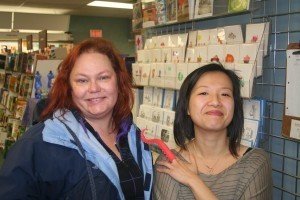
I didn't know I needed a tentacle-finger until I had one.
At parties, one of the first things I usually do is lose my drink, and this past Saturday was no exception. The difference was that I didn't have a chance to locate it: instead, I spent the entire two hours talking. For me, this is sheer lunacy. (To give you an idea: there used to be days when I didn't utter a word until my spouse came home from work.) And when I wasn't gabbing, I was reading.
So thank you, thank you, thank you! I am exhilarated. I am exhausted. And I feel so much love in the world for Mary, James, and the Agency.
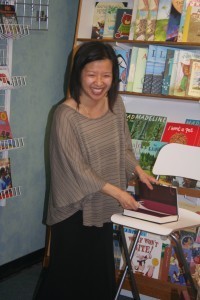
I am, above all other things, grateful.

